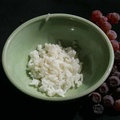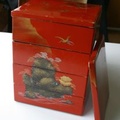>> Part 2
Unlike summer 's eruption, fall crept in day by day. The sagebrush clung to their dusty gray color but became more brittle. The moths, mosquitoes, and rattlers retreated. We folded and stored the mosquito nets. The jack rabbits were the only animals that I saw regularly, hopping nervously to the fence for the cook's scraps. The coyotes howled less urgently, or perhaps they migrated south. I was told that coyotes, too, fed on the food by the fence, but were more stealthy.
“They eat babies, too,” Eva told me. “When a girl gets pregnant and doesn't want the baby, she leaves it out there and by morning, just like that, it's gone.”
I knew she was lying. “My mother told me those babies were left at churches and hospitals.”
“I've seen their bones.”
So Eva and I walked along the barbed wire fence and sure enough, we found some tiny bones, but they looked like chicken leg and breast bones to me, remnants of mess garbage.
“See,” Eva pointed to the fragments.
“Come on, anyone can see they're not human bones,” I said.
“How do you know? You ever see real human ones?”
She had a point, but I didn't see any reason to draw this out. I pretended interest in the unusual cloud formations and changed the subject.
* * *
Then school started once more and I was a sixth grader. Mrs. Bender was our teacher again and Mr. Hinman continued as music director. My brother joined the Troop 179 Boy Scouts and learned to play the trumpet so he could join the Bugle Corps. He practiced diligently. He went to “socials,” forbidden to sixth and seventh graders. My friends and I practiced the jitterbug and the two-step so we'd be ready when “the time came.” We listened with pitcher ears as the older girls gossiped and giggled about “making out” in dark corners and the older boys bragged about the number of willing girls they had kissed.
* * *
One morning the classroom buzzed with gossip: Sumi's brother who had “Itchy Feet” was found hiding behind a building in Granada and brought back to camp. Several young men had attempted prior escapes from camp but all had been caught. Their punishment was work at a menial job and attendance at special “rehab” classes. I wasn't sure what they were taught—more obedience?
I was taken aback that Sumi's brother had tried to escape and find his way alone back to California. He was only several years older than Sumi and although I didn't know the family well, they seemed to be a cohesive and caring family. After all, it was Sumi's father who had found his way to our classroom to “save” us in that dust storm and had lead students safely home. I wished I had such a heroic father. However, a loving family was, perhaps, not the issue. This young man had fled toward freedom beyond the barbed wire with the same yearning that I had. Yes, I yearned to flee, too, and he had been brave enough to try only to be branded “bad.” I secretly applauded him and when Sumi returned to school the next day I intended to confess my feelings to her. However, as soon as she stepped in the door, the students suddenly became busy at their desks and no one spoke to her, as if she had conspired with her brother. I timidly followed the pack. In time we forgot about the incident, and it seemed too late to bring it up again. Or perhaps it was cowardice. (END)
* * *
Author's note: This is Chapter 3 of Gallery Four of my yet unpublished book, 18286. It is only one of the photographs and watercolors that accompany the story which are not included here.
© 2010 Lily Yuriko Nakai Havey





